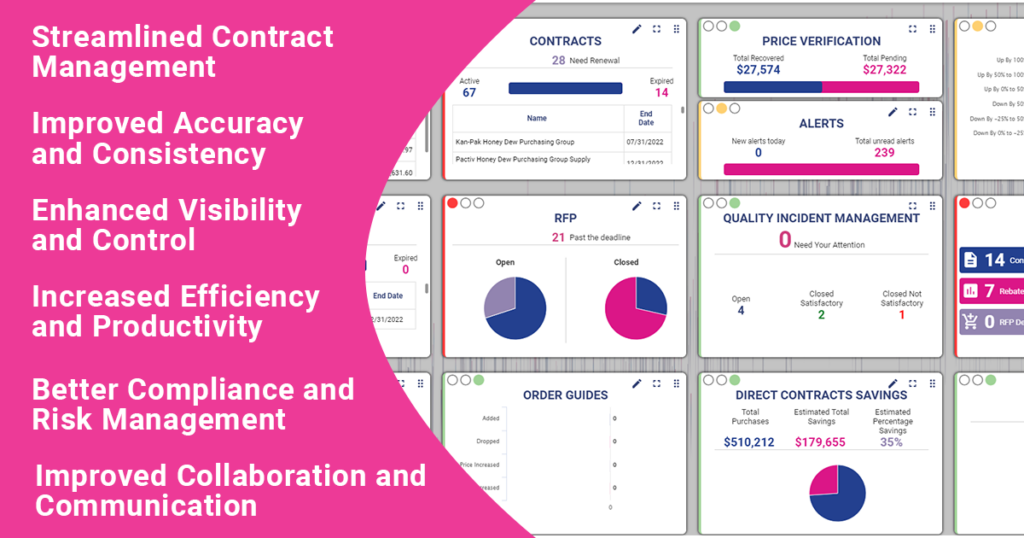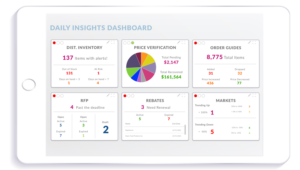Achieving and maintaining success requires careful orchestration of numerous elements – and at the core of this intricate dance lies effective contract management. As the demand for operational efficiency and cost-saving opportunities continues to rise, foodservice operators are increasingly turning to innovative solutions to streamline their processes.
This article delves into the pivotal role of contract management in the realm of foodservice, shedding light on how modern Software as a Service (SaaS) solutions can empower operators to navigate the complexities of contracts, boost efficiency, and unlock substantial cost-saving potentials.
Whether you’re a seasoned industry professional or a fresh face in the culinary landscape, understanding the nuances of contract management and its seamless integration with cutting-edge technology can be the key to unlocking unparalleled success in the competitive foodservice landscape.
 What is contract management?
What is contract management?
Hospitality contract management is a process by which businesses in the hospitality industry, such as hotels, resorts, and restaurants, manage contracts with vendors, suppliers, and other service providers. The primary goal of hospitality contract management is to ensure that these businesses receive the services and products they need to operate efficiently and effectively.
Why is contract management important?
Contract management is vital in the foodservice industry due to its impact on cost control, quality assurance, and overall operational efficiency.
By effectively managing contracts, businesses can ensure that agreed-upon prices, terms, and conditions with suppliers are followed, leading to better cost control and financial stability in an industry known for tight profit margins. Contracts outline quality specifications and regulatory compliance, ensuring that the delivered ingredients, products, or services maintain the desired level of quality and adhere to important regulations.
Strong supplier relationships, facilitated through contract management, enable better collaboration and negotiation leverage, which ultimately enhance the success of foodservice operations.
Additionally, well-managed contracts help mitigate risks, provide accountability, and offer the flexibility needed to adapt to changing market dynamics. In a sector focused on consistency and reliability, effective contract management paves the way for streamlined operations, customer satisfaction, and successful budget planning.
What are the key concepts of contract management?
Key concepts of contract management include:
- Contract Creation: This involves drafting a clear and comprehensive contract that outlines the terms, conditions, rights, and obligations of all parties involved. It’s essential to ensure that the contract is legally sound and aligned with the goals of the parties.
- Contract Negotiation: This phase involves discussions and bargaining between the parties to reach an agreement on the contract terms. Negotiations cover aspects such as pricing, deliverables, timelines, and other relevant terms.
- Contract Execution: Once the contract is finalized and agreed upon, it is signed and becomes legally binding. This phase marks the beginning of the contract’s implementation.
- Performance Monitoring: Contract management includes tracking and assessing the performance of both parties to ensure that they are fulfilling their obligations as outlined in the contract. Key performance indicators (KPIs) are often used to measure performance.
- Communication: Open and transparent communication between parties is crucial throughout the contract’s lifecycle. This includes addressing concerns, resolving disputes, and keeping all stakeholders informed about progress.
- Risk Management: Contracts often address potential risks and include provisions for mitigating them. Effective contract management involves identifying, assessing, and managing risks to minimize negative impacts on the parties involved.
- Change Management: Circumstances might change during the contract period, requiring adjustments to the terms. Change management involves documenting and implementing any modifications while ensuring they are agreed upon by all parties.
- Compliance and Governance: Contracts are often subject to legal, regulatory, and industry-specific requirements. Contract management ensures that all parties adhere to these requirements to avoid legal issues.
- Documentation: Proper documentation is essential for record-keeping and reference purposes. This includes maintaining a complete history of contract versions, amendments, correspondence, and performance evaluations.
- Renewal and Termination: Depending on the contract’s duration and terms, it may need to be renewed, renegotiated, or terminated. Effective contract management involves planning for these eventualities and ensuring a smooth transition.
- Relationship Building: Building strong and healthy relationships with all parties involved in the contract is key. Good relationships foster cooperation, trust, and better outcomes.
- Dispute Resolution: In case of disagreements or conflicts, contracts often include provisions for dispute resolution. Effective contract management involves handling disputes efficiently and minimizing their impact on the parties’ collaboration.
- Auditing and Accountability: Regular audits of contract performance and compliance ensure that all parties are accountable for their obligations and that the contract’s objectives are being met.
These concepts collectively contribute to successful contract management by ensuring that contracts are executed smoothly, parties’ interests are protected, and the intended benefits are realized.
What is contract management technology?
Contract management technology refers to the use of digital tools and software solutions to facilitate the creation, negotiation, execution, monitoring, and analysis of contracts throughout their lifecycle.
It aims to streamline and optimize the various processes involved in contract management, which can include drafting, negotiation, approvals, signatures, compliance tracking, and performance assessment. This technology helps organizations manage their contracts more efficiently, reduce manual workloads, enhance accuracy, ensure compliance, and improve overall contract performance.
Contract management technology can be deployed as standalone software or integrated into larger enterprise software suites. Its primary goal is to increase efficiency, reduce risk, and improve transparency in the management of contractual agreements, ultimately leading to better business outcomes.
What are the benefits of using contract management technology?
Foodservice operators can benefit significantly from using contract management technology to streamline their operations, improve efficiency, and ensure compliance. Here are some key benefits:
- Efficient Contract Creation: Contract management technology provides templates and standardized processes for creating contracts. This reduces the time spent on manual drafting and ensures consistency across contracts.
- Faster Negotiations: Automated workflows and collaboration tools enable quicker negotiation cycles. Stakeholders can collaborate in real-time, reducing delays and accelerating the approval process.
- Improved Accuracy: Technology minimizes human errors in contract creation and data entry. This leads to more accurate terms, pricing, and other contract details, reducing the risk of disputes.
- Enhanced Visibility: A centralized repository allows foodservice operators to easily access and track contract information. This visibility into contract statuses, renewals, and key dates helps prevent missed opportunities and expirations.
- Compliance Management: Contract management technology can include compliance tracking features that ensure the terms of contracts are adhered to. This is crucial in the food industry, which often has regulatory and quality standards to meet.
- Risk Mitigation: The system can flag potential risks within contracts, such as unfavorable terms or non-compliance issues, allowing operators to take proactive measures.
- Cost Savings: Automated workflows and reduced manual work lead to operational efficiencies and cost savings. The technology also helps in identifying cost-effective suppliers and monitoring pricing terms.

- Vendor Management: For foodservice operators dealing with multiple suppliers, contract management technology helps manage vendor relationships, track performance, and assess the quality of goods and services received.
- Renewal Management: Automated notifications for contract renewals help operators avoid missing renewal dates. This ensures continuity of supplies and services without disruption.
- Data-Driven Insights: Contract management technology can generate reports and analytics about contract performance, supplier relationships, and spending patterns. These insights can inform strategic decisions and negotiations.
- Electronic Signatures: Digital signing capabilities eliminate the need for physical signatures, expediting contract execution and reducing paperwork.
- Scalability: As foodservice operations grow, contract management technology can easily scale to handle larger volumes of contracts and vendors.
- Audit Trails: The technology maintains a record of all activities related to a contract, creating a transparent audit trail that can be valuable in case of disputes or regulatory audits.
- Time Savings: Automating contract processes reduces administrative burdens, freeing up staff to focus on more strategic tasks.
- Competitive Advantage: Implementing advanced contract management technology demonstrates a commitment to efficient operations and vendor relationships, potentially giving foodservice operators a competitive edge.
Overall, contract management technology streamlines operations, ensures legal and regulatory compliance, reduces risks, and enhances vendor relationships for foodservice operators, contributing to their success in a competitive industry.
Efficient Contract Management with InsideTrack
InsideTrack houses all of your contracts in one place. Receive alerts when contracts are coming up for renewal and ensure you get every rebate dollar and deviated price. Our contract renewal report identifies items being purchased from manufacturers that are not on your contracts.
Even better? The InsideTrack Contract Report shows how new contracts affect your margins. You can run the report before the contract is signed to see the potential impact and arm yourself with as much information as possible for negotiations.
Book a demo with InsideTrack today!




